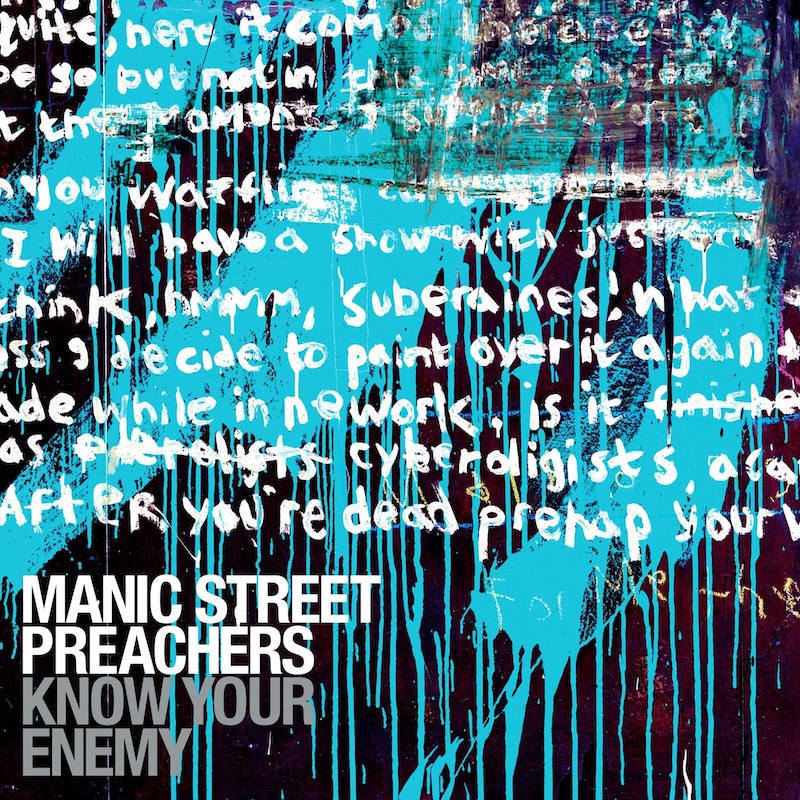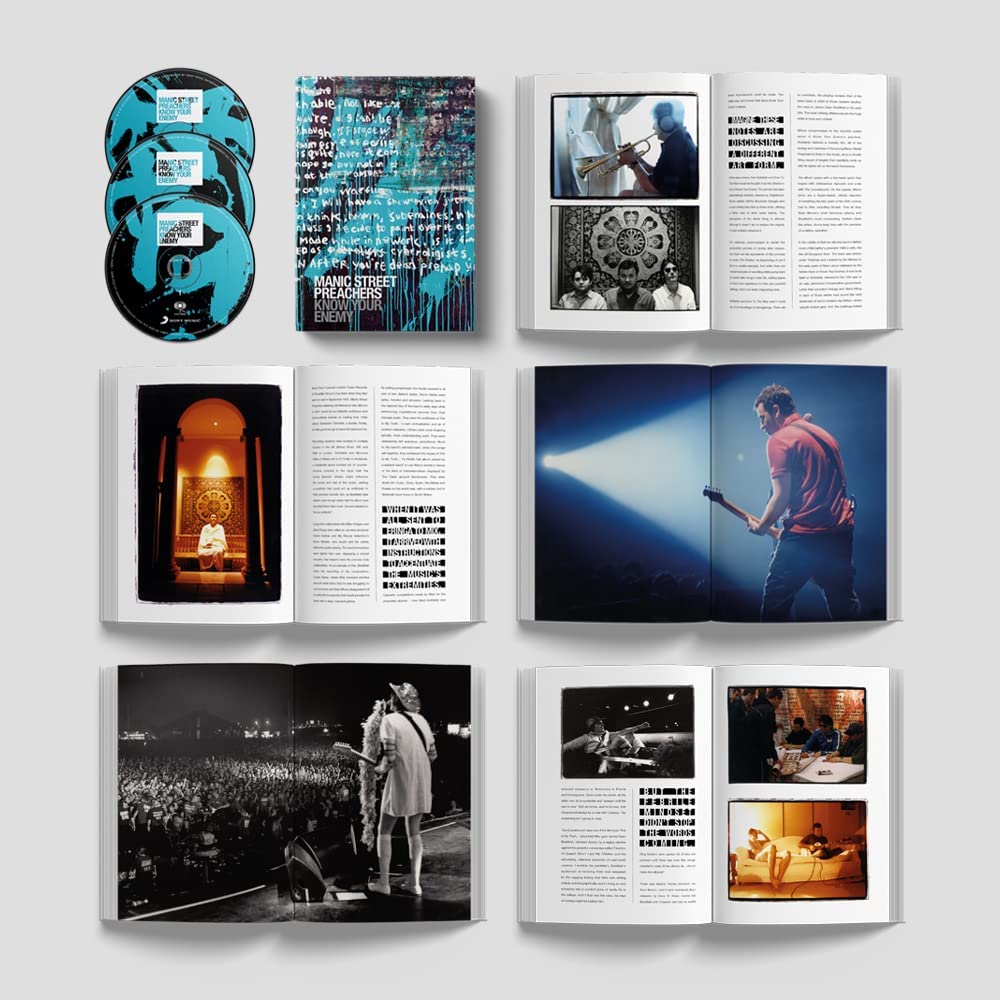
Introduction
It takes a band as contrary as the Manic Street Preachers to weave so revisionist a path through their own history for, while reissues of their first four albums emerged largely unscathed, special editions of ITIMTTMY and Send Away the Tigers showed a tendency to tamper with structure. While not, perhaps, an unprecedented move, it always struck me as odd that the excised tracks (Nobody Loved You and Underdogs respectively) were not included in their original studio form, even among the bonus tracks, as if the band wanted to erase them altogether. It is a move that has infuriated some, as has the ad hoc approach to packaging, which has seen the various special editions emerge as (deep breath): digipacks (the 10th anniversary editions of THB and EMG), 10×10 box sets (GT), 12 x 12 boxsets (THB 20 and EMG 20), book sets (GATS, KYE) and, er, miscellaneous (ITIMT) – it plays havoc on the CD shelf.
At any event, if ever an album deserved an overhaul, it is the much maligned Know your Enemy. Originally planned as an expansive double album, the concept was shelved due to label nerves and the record ended up as a strange compromise. The band didn’t exactly help themselves. In the wake of the album’s arena-filling predecessors, the Manics performed an abrupt left turn, issuing the Masses Against the Classes single. A taut punk song, it raised hopes for a tougher album, although it would be another year before fans found out exactly what the band had in store. Imagine the confusion, then, when the Manics dropped two singles on the same day, signifying a wildly disparate approach. On the one hand there was Found That Soul, a crunchy, three-minute punk song, which echoed Masses Against the Classes. On the other hand, there was So Why So Sad, a breezy, sixties-style pop song with lyrical references to Nicky Wire’s beloved Sonic Youth and not a hint of distorted guitar to be found.
The singles were apt. KYE proved to be a sprawling album that absolutely packed a single disc at seventy-five minutes. With hindsight, the band’s ambitions, although admirable, were slightly misplaced. A double album would have provided the space for the experimentation they had in mind. As a single album, however, it required both work and patience on behalf of the listener and, although many fans grew to love it, many more were simply not prepared to sift through seventeen tracks of caustic punk, sweeping ballads, and art rock, especially when the sequencing placed the two strangest pieces right at the heart of the disc. This is a shame because KYE is packed with great songs. Acting as a precursor to the various digressions of the band’s latter-day albums, it is a work of restless creativity, bridging the rock epics of the immediately preceding period and the more abrasive rock of the first three albums. Thus, this timely reissue offers an opportunity to reassess the record according to the band’s original designs.
The Package
Know Your Enemy returns (more or less) as originally intended, in a variety of editions. A double vinyl set features the originally planned running order, while a two CD set adds ten bonus cuts, spread across the two discs (a habit that is a tad annoying). A deluxe, three CD package lands in the neat book format typical of the various deluxe editions the band have released since Journal for Plague Lovers and adds another sixteen bonus tracks on the third disc. The book set also features an essay from band collaborator Robin Turner, helping to place the overall album in perspective. Strangely, no one thought to offer a DVD (or blu ray) of Louder Than War, an addition that surely would have made this package definitive, but this is a minor gripe for an otherwise excellent and well thought out package.

The Audio
Now split into two distinct halves, some will miss the screeching shifts in dynamic that saw tracks like Intravenous Agnostic shatter the calm of the lovely Ocean Spray. There’s also that question of revisionism, with certain studio tracks swapped out for remixes or subtly altered versions. Most notably, So Why So Said is now represented by the Avalanches remix, while Found That Soul is given an American sheen by Thomas Lord Alge. Masses Against The Classes is also altered, with James’ spoken word coda excised from the cut, while Door To The River is a much more basic affair than the heavily orchestrated version found on Forever Delayed. At least the original SWSS remains in the bonus tracks, but regardless of whether the band prefer it, the Avalanches remix is a bit of an odd move, although it feels less jarring after a few listens. Overall, however, with two discs and a slew of extra tracks, this new edition showcases an ambitious band exploring their influences with abandon, while the remix / remaster is nothing short of stunning.
Door To the River
Opening the set, the perfectly lovely Door to The River would make a very strong album on its own. With four additional tracks, it emerges as a more concise follow up to ITIMT, mixing mid-tempo rockers and gorgeous ballads to powerful effect, distilling much of what was great about that period of the band’s evolution. In this new incarnation, alongside established classics like Ocean Spray, the album benefits from reclaiming its title track (not heard by fans until the following year’s Forever Delayed) and, while some may miss the lush orchestration of that version, it is the better for its more stripped-down approach. Beyond this, the original KYE track selection is bolstered by and two Ocean Spray b sides: Just A Kid and Groundhog Days, both of which make perfect sense in this setting, helping the album to maintain an impact, despite its predominantly languid pacing. Then there’s the previously unreleased Rosebud, an unconventional gem with a schizophrenic pull that condenses the original album’s remit into four, near-perfect minutes that deserved far more than to be left on the studio floor. The bonus cuts are fine too, chosen to neatly augment the album, although the purist in me would still rather hear the two discs shorn of extras.
Overall, the Door to The River set is worth the price of admission alone, especially with the new mix/master working to sparkling effect, and it will cause many to reappraise this selection of truly wonderful, and oft-underappreciated songs.
Solidarity
While Door to The River would have sated the appetites of newer fans; for those who worshipped at the altar of Masses Against the Classes (and, by extension, the band’s older material) Solidarity is, to at least some extent, the disc that many hoped Know Your Enemy would be. Comprising twelve tracks, this tougher disc (albeit with plenty of left-field leaps), makes its political ambitions clear by adding the previously hidden We Are All Bourgeois Now to its track list and placing the previously stand-alone Masses Against The Classes at its heart. There’s also the previously unreleased Studies in Paralysis and a brilliant revision of the mix, which sees the tracks gain new depth and texture – especially the REM-ish My Guernica.
Perhaps the biggest revelation is just how alternative the album sounds with its new running order. Intravenous Agnostic, which always sounded like the band having a bust up with Sonic Youth, now blazes as the album opener and, although Tom Lord Alge’s mix of Found That Soul feels a touch too polished for my taste, the sequencing here highlights the outré instincts the band were indulging at the time, with even the cover of We’re All Bourgeoise Now slotting neatly into its new position, acting as both a lyrical hook and a palette cleanser after the opening barrage.
As a result, Solidarity reminds us that KYE was not an album of halves, but of thirds. Alongside the (relatively) easily categorised ballads and heavier songs, there were experimental numbers galore. The Doors-esque The Convalescent now sits alongside the woozy post-punk of Baby Elian, while Wattsville Blues and Miss Europa Disco Dancer, hitherto at the heart of KYE, conclude the record, and it’s wonderful. What other band would close a sprawling double album with a repeated refrain of “brain dead motherfuckers”? Admittedly, this gloriously defiant gesture is slightly neutered by the bonus tracks tacked placed immediately after, but it is nevertheless impressively abrasive in intent. Fortunately, the quality of the additional tracks ameliorates the sting, and for those who didn’t collect the singles, it’s good to have the b sides (always a speciality of the Manics) all in one place.
Demos
For rather more invested fans, the three-disc package adds a selection of demos. While not exhaustive, we can assume the best of the album can be found here, but it is very much a collection for those whose interest goes beyond the conventional. Of the sixteen tracks offered here, eleven are basic home recordings, while the remaining five are studio sessions. Generally, the tracks vary relatively little in terms of structure from the album version, but the selection does offer a certain insight into the band’s creative process at the time (something that Nicky admits was troubled), and you can almost hear the band trying to work out whether they were still the stadium band of the preceding years, or the punkier prospect of their youth. However, while there is an intimacy to the cassette demos that is beguiling, this is not a disc intended for regular listeners, and is very much something for completists.
Conclusion
Often, remastered, and reissued albums are a simple upgrade bordering on a cash grab. Some bands, mindful of the technical limitations of their age go further with a remix, but comparatively few artists so radically overhaul an album as the Manics have here. Few would argue that KYE was a flawed gem, but here the band’s ambitions are much clearer to see, with both the revised running order and the gorgeous remix showing a band overflowing with creativity. As history records, the original struggled to juggle the sheer amount of material, but the space afforded by two discs renders KYE as a lost masterpiece, and while it is a shame the bonus tracks were placed on the album discs (presumably to keep costs accessible), this expanded reissue is an essential opportunity to reassess this work. Of all the Manics’ reissues to date, this truly is an essential purchase. 9.5/10



